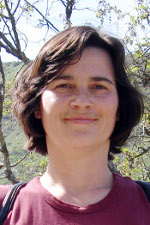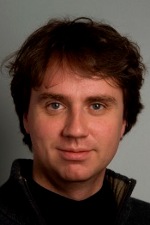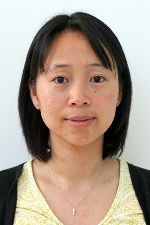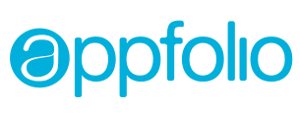Graduate Student Workshop 2010
The focus of GSWC is to highlight graduate student research, promote the exchange of ideas among students, faculty, researchers, and industry, and familiarize new graduate students with the research conducted within our department and the larger computer science community. Each year, GSWC adopts a theme which invites discussion from a panel formed by industry speakers. This year, we also invite speakers from the academic field to present their research work within the context of this theme.
Workshop Information
GSWC 2010 will be held October 8, 2010 in the Engineering Sciences Building room 1001. The Engineering Science building is located on the campus map at location D5 with the label "Engineering Science". The actual room is approximately located where the 'S' in Science is on the label. The nearest Parking structure for the event is Parking Structure 10 located just to the right of Engineering Science on the map.
Proceedings
You can grab a pdf copy of the proceedings here.
Workshop Schedule
| Opening | ||
|---|---|---|
| 08:00-08:15 | Breakfast | |
| 08:15-08:30 | Opening remarks | Amr El Abbadi Chair of UCSB Computer Science Department |
| Multifarious Session A led by Nichole Stockman | ||
| 08:30-08:45 | Eliminating Timing and Termination Leaks | Vineeth Kashyap |
| 08:45-09:00 | Efficient and Scene-Adaptive Capture of Focal Stacks | Daniel Vaquero |
| Industry Panel | ||
| 09:00-10:00 | Future Challenges in Computer Science |
|
| Architecture Session led by Bita Mazloom | ||
| 10:00-10:15 | A Case for Smartphone Reuse to Augment Elementary School Education | Xun Li |
| 10:15-10:30 | Fighting Fire with Fire: Superlattice Cooling of Silicon Hotspots to Reduce Global Cooling Requirements | Susmit Biswas |
| 10:30-10:45 | Information Flow Secure Architectures | Mohit Tiwari |
| Academic Keynote | ||
| 10:45-11:30 | Engery Efficient Computing In this talk I give an overview of the algorithms we have developed at UCSD to significantly lower the energy consumption in computing systems. We derived optimal power management strategies for stationary workloads that have been implemented both in HW and SW. Run-time adaptation can be done via an online learning algorithm that selects among a set of policies. We generalize the algorithm to include thermal management since we found that minimizing the power consumption does not necessarily reduce the overall energy costs. To reduce the performance costs typically associated with state of the art thermal management techniques, we developed a new set of proactive management policies. The experimental results using real datacenter workloads on an actual multicore system show that our proactive technique is able to dramatically reduce the adverse effects of temperature by over 60%. Most recently we have shown that symbiotic scheduling of workloads in virtualized environments can lead to average 15% energy savings with 20% performance benefit in high utilization scenarios. I will also present some of the recent work we had done to address the energy savings in battery powered and energy harvesting systems. We are designing a new kind of “citizen infrastructure”, CitiSense, as an end-to-end health and environmental information system with near real-time data streams and feedback loops from the system to the sensing, processing, and actuation infrastructure. We have developed adaptive algorithms to tradeoff accuracy of computation versus the available energy for such systems, while taking into account the energy harvesting capabilities. Sponsored by the Department of Computer Science, the Department of Computer Engineering and the Institute of Energy Efficiency |
Tajana Šimunić Rosing Director of System Energy Efficiency Lab UCSD |
| Multifarious Session B led by Lara Deek | ||
| 11:30-11:45 | Internet usage and performance analysis of a rural wireless network in Macha, Zambia | David Johnson |
| 11:45-12:00 | Fast Nearest Neighbors in Large and Composite Networks | Petko Bogdanov |
| 12:00-12:15 | The Tipping Point of the Blogosphere: Connector, Maven, Salesman and Translator Blogs | Ceren Budak |
| Lunch / Poster Session | ||
| 12:15-01:15 | Posters and Lunch | |
| Security Session led by Gianluca Stringhini | ||
| 01:15-01:30 | Are BGP Routers Open To Attack? An Experiment | Ludovico Cavedon |
| 01:30-01:45 | Hacking for Fun and Education: Organizing the UCSB iCTF | Bryce Boe |
| 01:45-02:00 | DYMO: Linking Network Traffic to Application Code | Bob Gilbert |
| Industry Keynote | ||
| 02:00-02:45 | Cloud Computing and Software Security Software-as-a-service can provide great benefits, such as ubiquitous, reliable access to data, but cloud computing also raises new challenges and opportunities for computer security. Large-scale Web services must address both traditional security concerns, such as user authentication and key management, as well as newer issues like those raised by the need to maintain users' privacy. At the same time, cloud computing has innate security advantages, such as its use of easily updated and malleable software, which enables instrumentation ranging from individual specialization to large-scale execution summarization. This talk will briefly outline some of these issues and potential research topics in cloud security, with examples from Google's past and current technology efforts used to give context. |
Úlfar Erlingsson |
| Closing | ||
| 02:45-03:00 | Closing remarks followed by the walk to Goleta Beach! | Bryce Boe |
External Participants

Tajana Šimunić Rosing
Academic Keynote

Úlfar Erlingsson
Industry Keynote

Lingli Zhang
Panelist

Joe Alfaro
Panelist

Jon Walker
Panelist
Platinum Supporters
Gold Supporters
Program Committee
| Member | Position | Affiliation |
|---|---|---|
| Bryce Boe | Chair | Computer Security Group |
| Lara Deek | Vice-Chair | Networking and Multimedia Systems Laboratory |
| Wei Tang | ECE Co-Coordinator | High Level Design Group |
| Jennifer Chen | ECE Co-Coordinator | |
| Petko Bogdanov | PC Member | The Data Mining and Bioinformatics Lab |
| Ceren Budak | PC Member | |
| Sudipto Das | PC Member | Distributed Systems Lab |
| Aaron Elmore | PC Member | |
| Luca Foschini | PC Member | |
| Bita Mazloom | PC Member | ArchLab |
| Nichole Stockman | PC Member | 4Eyes Lab |
| Gianluca Stringhini | PC Member | Computer Security Group |
| Jonathan Ventura | PC Member | 4Eyes Lab |
| Christo Wilson | PC Member | Current Lab |
| Mike Wittie | PC Member | Networking and Multimedia Systems Laboratory |




